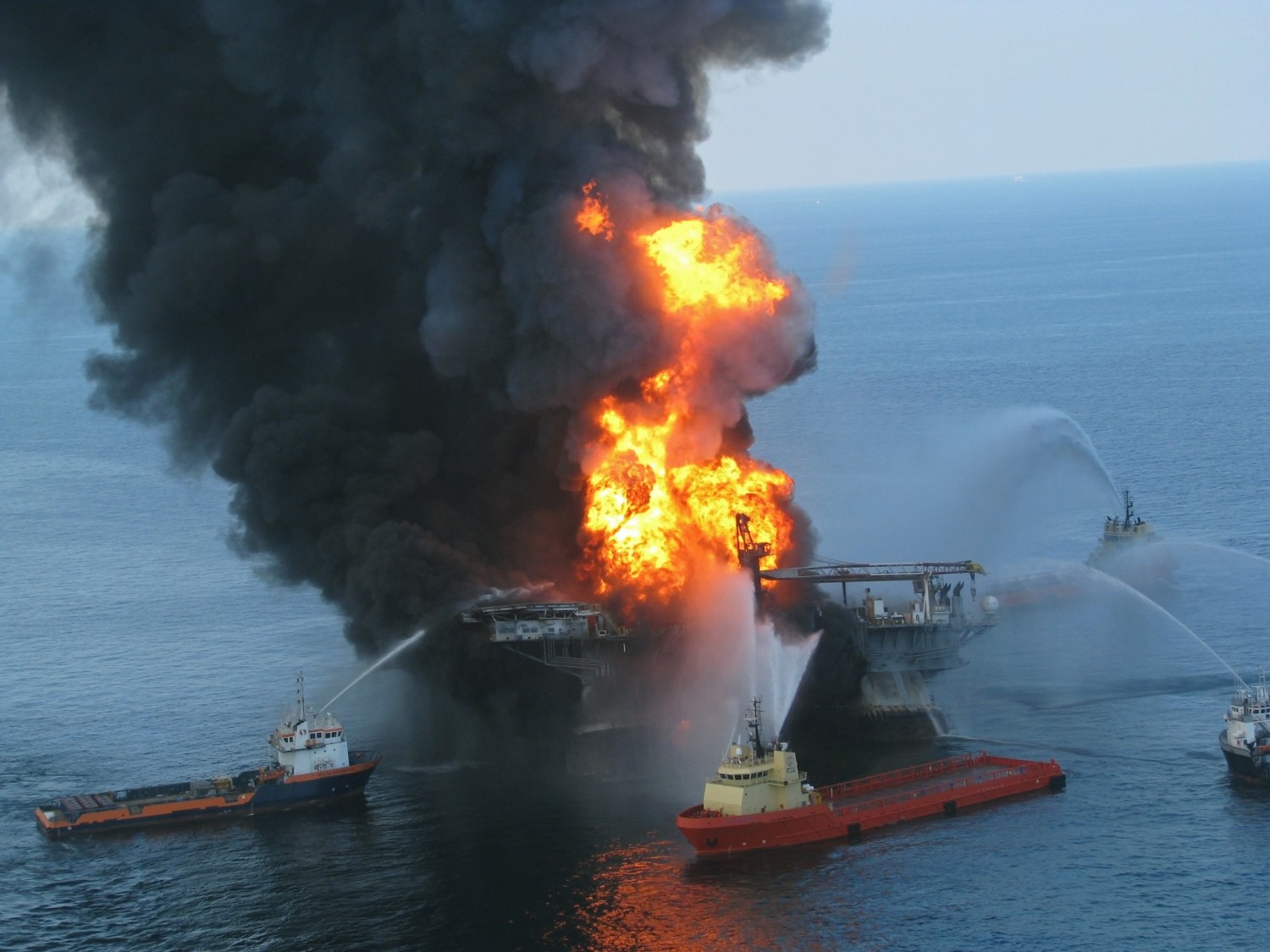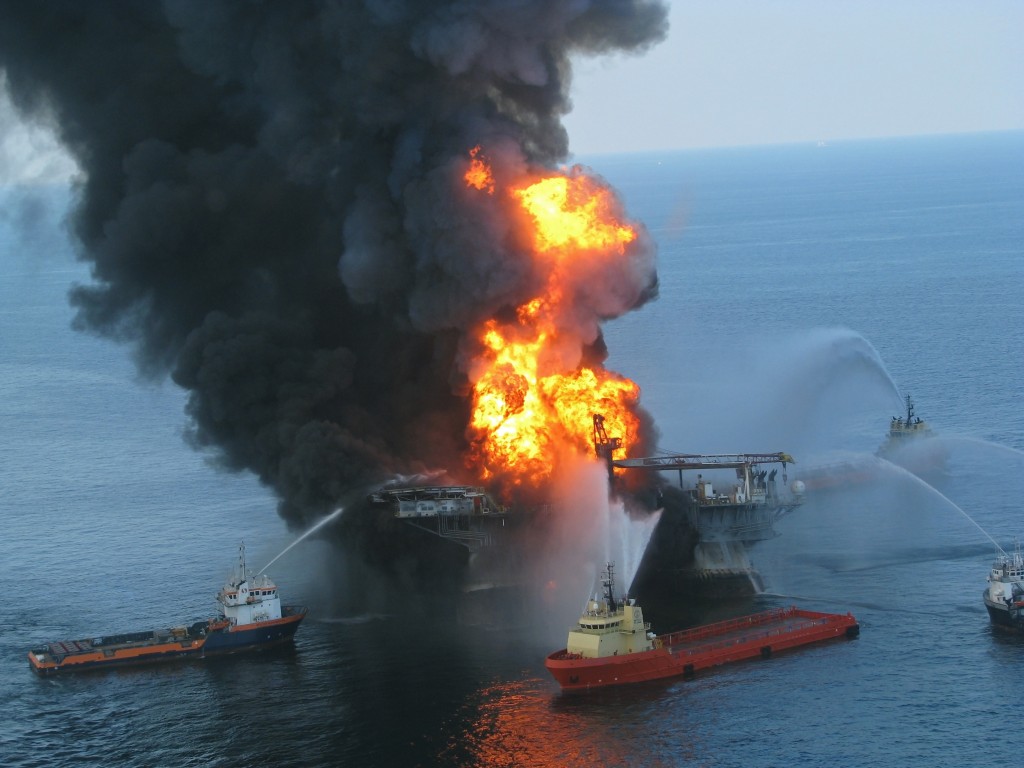Halliburton Co.’s agreement to pay $1.1 billion to settle most of the lawsuits over its role in the biggest U.S. offshore oil spill helps it avoid billions more in potential penalties down the road.
The oilfield services company, accused of doing defective work on BP Plc’s Macondo well before it exploded in 2010, killing 11 men and dumping millions of barrels of crude oil into the Gulf of Mexico, said today the agreement resolves “a substantial majority” of its liability in the disaster.
Halliburton’s settlement comes as the federal judge overseeing oil-spill cases weighs fault for the accident, and averts the risk of a more costly judgment against the company in favor of some spill victims. The agreement removes much of the uncertainty that has plagued Halliburton for the past four years as investors waited to see how much the company might be hurt by payouts in the case. With its biggest piece of liability resolved, Halliburton can refocus its attention on developing new oilfield technology that will help it boost profits worldwide.
“It’s actually a pretty decent settlement for them,” said Rob Desai, an analyst at Edward Jones in St. Louis, who rates the shares a hold and owns none. “This eliminates an overhang.”
Halliburton has set aside reserves of $1.3 billion for costs related to the incident. Shares fell 0.1 percent to $67.54 at 10:16 a.m. in New York trading.
Ruling Expected
U.S. District Judge Carl Barbier, who oversees the spill cases in New Orleans, is expected to rule within days or weeks on how much blame each company carries for the disaster. A decision that Halliburton committed fraud and gross negligence in the case would have opened the company to billions in punitive and compensatory damages.
The settlement avoids that by resolving both punitive and compensatory liability in most lawsuits from private plaintiffs and local governments. BP and Transocean both continue to face liability from those lawsuits.
Halliburton’s agreement is subject to court approval and doesn’t cover claims by states including Louisiana and Alabama, or private party claims eligible for compensatory damages only, such as businesses alleging harm from the federal drilling moratorium after the spill.
“Halliburton stepped up to the plate and agreed to provide a fair measure of compensation to people and businesses harmed in the wake of the Deepwater Horizon tragedy,” said co-lead plaintiffs’ attorneys, Stephen J. Herman and James P. Roy.
Biggest Payout
The $1.1 billion represents the most significant payout yet for Houston-based Halliburton in the disaster. Transocean Ltd., owner of the drilling rig and another defendant in the case, settled some claims for $1.4 billion last year, while BP has paid more than $28 billion and faces potentially tens of billions more.
Prior to the settlement, Halliburton had incurred legal fees and expenses of about $294 million, with $263 million of this reimbursed or expected to be covered by insurance, according to a July filing.
Since the spill, Halliburton has doubled its share price, while Transocean has lost 58 percent and BP has fallen 27 percent.
The settlement, being less than what Halliburton set aside, is considered a “non event” by investors, said Luke Lemoine, an analyst at Capital One Southcoast in New Orleans, who rates the shares a buy and owns none, said in a phone interview.
“If it was $2 billion or $3 billion, they might care, but it’s in line to slightly lower,” Lemoine said.
Bad Cement
The oil field services provider was accused by victims of the spill and by co-defendants including BP of doing defective work when it poured cement to plug the well before the explosion. The company also was accused of trying to hide its responsibility. Halliburton blamed the accident on decisions by BP.
The well blowout and fire aboard the Deepwater Horizon drilling rig killed 11 workers and upended the U.S. offshore drilling industry, halting new wells for months and spurring an overhaul in federal regulation. The accident also sparked hundreds of lawsuits against London-based BP, Halliburton and Vernier, Switzerland-based Transocean, the owner of the $365 million rig.
Fracking Market
Halliburton reached its settlement at a time when the North American market for hydraulic fracturing, or fracking, is improving after two years of falling prices have pinched profits. Customers in the U.S. are expected to boost spending on exploration and production 9.6 percent this year to a record $165 billion, according to Barclays Capital Inc.
Halliburton, the world’s biggest provider of fracking services, is forecast to double earnings to $6.27 a share, excluding certain items, by the end of 2016 from $3.15 last year, according to analysts’ estimates compiled by Bloomberg. The company is focusing on increasing sales with its technology to boost output in aging oil fields, and by expanding its business in deep-water wells and shale fields where hydraulic fracturing can be used to pump water, sand and chemicals underground to free trapped hydrocarbons.
In July 2013, the company agreed to a federal misdemeanor charge of destroying evidence in the oil spill case and paid a $200,000 fine. At the time, Halliburton said it also had made a voluntary contribution of $55 million to the National Fish and Wildlife Foundation.
Risks Averted
If Judge Barbier had found Halliburton acted with gross negligence in the case without the company having settled, plaintiffs could have claimed punitive damages. The contract between the companies tied to the Deepwater Horizon required BP to cover any compensatory damages assessed against Halliburton, Barbier ruled previously. However, the judge said that if he found fraud in Halliburton’s actions, he could cancel this protection, leaving the company on the hook for a share of billions of dollars in damages.
Compensatory damages pay victims for losses and injuries. Punitive awards are used to punish defendants for reckless behavior.
The case is In re Oil Spill by the Oil Rig Deepwater Horizon in the Gulf of Mexico on April 20, 2010, MDL-2179, U.S. District Court, Eastern District of Louisiana (New Orleans).
]]>






